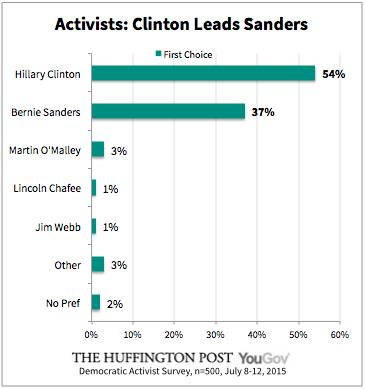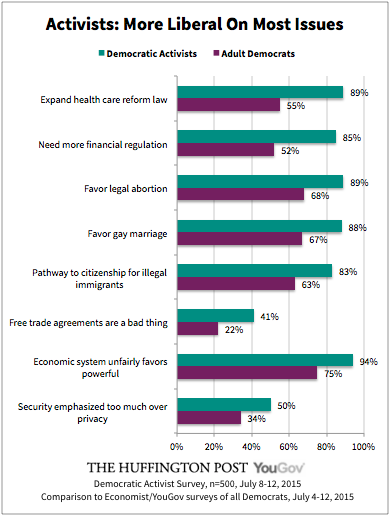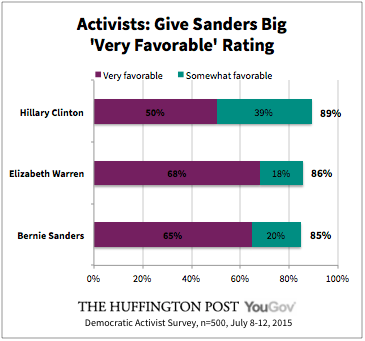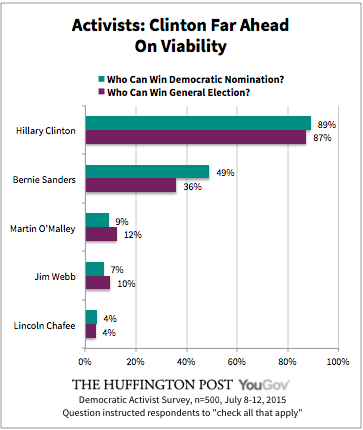
Most Americans, even if they're planning to vote in next year's presidential primaries, aren't paying much attention to the 2016 election right now. That's why The Huffington Post has been reporting on a different kind of survey, focusing on the people who are tuning in: the party activists who hold local office, work on campaigns or make significant volunteer commitments. Their opinions shouldn't be considered a prediction of who'll end up winning, but they do provide a better snapshot of where the campaigns stand right now.
Unlike the grassroots Republican activists, who are still making up their minds, their Democratic counterparts are mostly decided about the 2016 primary. Nearly three-quarters of those surveyed say they already have a good idea whom they'll vote for. As of early July, that's mainly former Secretary of State Hillary Clinton, who has a commanding lead among her party's faithful. Sen. Bernie Sanders (I-Vt.) has rapidly emerged as Clinton's most serious rival.
The Democratic activists surveyed are significantly more liberal than the party as a whole -- exactly the kind of people who've rallied around Sanders as the de facto alternative to Clinton. But most of the activists see Clinton as the Democrats' only viable option for winning the presidency.
Very few remain undecided at this stage or favor a candidate other than Clinton or Sanders.
Although the Republican activists surveyed by HuffPost tend to resemble the GOP as a whole, the Democratic activists surveyed -- those who have run for or held office, served as party officials, worked on campaigns, or volunteered their time or money before elections -- look very different from the much larger pool of Democratic voters. The vast majority (83 percent) are white, 78 percent describe themselves as liberal, and 6 in 10 have college degrees. The Democratic rank-and-file, on the other hand, is roughly 60 percent white. Only about half describe themselves as liberal, and fewer than half have college degrees.
Like their Republican counterparts, Democratic activists are highly attentive to politics. Nearly all (85 percent) say they follow news about government and public affairs "most of the time," compared to just 39 percent of all adult Democrats surveyed in recent Economist/YouGov polling.
These differences between the activists and other Democrats extend beyond demographics, political labels and levels of attention, covering nearly every issue of consequence in the national political debate. Close to 90 percent of the activists, for example, favor gay marriage, legal abortion, greater regulation of financial markets and an expansion of the health care law. Ninety-four percent say that the U.S. economic system "unfairly favors powerful interests." Although a majority of Democrats as a whole share the same positions (on recent YouGov surveys that asked identical questions), their support for these progressive planks registers significantly lower.
In other words, the Democratic activists should be the perfect base of support for Sanders, a candidate calling for a “political revolution” to combat income inequality and champion progressive causes. Yet even with these voters, Clinton is the favorite.
Even among the most liberal of the activists -- the 38 percent who describe their politics as "very liberal" -- Sanders runs just a few percentage points ahead (49 to 44 percent). Clinton leads among all other Democratic activists by a 2-to-1 margin (60 to 29 percent).
If Sanders can only manage to eke out an edge of a few points among the most liberal Democrats, he faces far greater problems with the overall Democratic electorate, which includes a far larger share of the minority voters with whom he's often struggled to connect. The activist survey included just 83 non-white respondents, but they broke overwhelmingly for Clinton over Sanders (67 to 17 percent), with just a quarter saying they are looking for an alternative to Clinton.
That said, the Vermont senator has experienced a remarkable ascent. Virtually all of the activists (85 percent) rate him favorably -- a level of popularity nearly as high as those of Massachusetts Sen. Elizabeth Warren (86 percent), Hillary Clinton (89 percent) or her husband, former President Bill Clinton (90 percent).
Sanders' fans are also unusually ardent in their regard for him. Nearly two-thirds of the activists give Sanders a very favorable rating, compared to 50 percent for Hillary Clinton. Sanders' rating makes him more intensely popular among his party's grassroots than any of the Republican candidates are among the GOP's core voters.
So why does Sanders still trail? His biggest problem is viability. Although nearly 9 out of 10 activists see Clinton as able to win the nomination and the general election, just under half see Sanders as able to win the nomination and only 36 percent think he can triumph in November.
Even some of his supporters have reservations. Twenty-nine percent of those who call Sanders their top choice still don't think he could win in November. By contrast, just 4 percent of Clinton's backers express similar doubts about her.
This is a judgment about more than Clinton's campaign machinery or fundraising advantage. Just 56 of the activists say Sanders would be "acceptable to most Democrats," compared to 84 percent who say the same about Clinton.
But the second and perhaps more significant challenge to the Sanders candidacy is Clinton's broad appeal to the activist wing of the Democratic Party. A whopping 90 percent of the activists surveyed say they would be at least satisfied if Clinton were the 2016 nominee, with 58 percent, including more than a quarter of Sanders' current backers, saying they could be enthusiastic about her nomination.
Only about a third of the activists say they would prefer to see someone who's not Clinton chosen as the party's nominee. Their reticence is largely focused on her politics -- 49 percent who'd prefer another nominee say they have concerns about her positions on issues, while just 22 percent cite concerns about her character. Another 9 percent worry that she isn't electable.
Yet even those who'd rather see a different candidate win don't tend to be deeply opposed to her candidacy. Just 5 percent of the activists say they could never support Clinton, and just 6 percent say they would be angry if she were nominated.
If this presents an uphill battle for Sanders, it's a nearly insurmountable challenge for Clinton's other rivals in the party. Taken together, the rest of the Democratic field -- including former Rhode Island Gov. Lincoln Chafee, former Maryland Gov. Martin O'Malley and former Virginia Sen. Jim Webb -- represent the first choice of less than 10 percent of the activists surveyed.
These other candidates aren't exactly unpopular -- few Democrats say that they'd be angry to see Chafee, O'Malley or Webb as their nominee or that they'd be unwilling to support any of them in the general election. But most activists view that as exceedingly unlikely to happen. Fewer than 1 in 10 think that anyone besides Clinton or Sanders is capable of winning either the nomination or the presidency.
With months still to go before anyone casts a primary ballot or votes in a caucus, it's premature to write off any candidate's chances. Even among these highly engaged activists, preferences can change. For the moment, however, Democratic activists see the race for their party's nomination as a two-candidate contest, and Clinton is winning.
The HuffPost/YouGov survey consists of 500 completed interviews of self-identified Democrats selected from YouGov's opt-in online panelists who met the screening criteria for party activism. Interviews were conducted July 8-12, 2015. Full results of the survey are here, and crosstabulations are here.
The screening criteria were as follows: registered voters who think of themselves as Democrats, say they would vote in a Democratic primary in their state, and say they have either run for office, held elected public office, been a paid staffer for a political campaign or elected official, been a party official, or substantively contributed time or money to a campaign.
For weighting purposes, a sampling frame was created based on the American National Election Studies using similar measures of political activism. Cases were weighted to the frame using an iterative process known as raking. Weights were based on party identification, age, gender and education.
The Huffington Post has teamed up with YouGov to conduct daily opinion polls. You can learn more about this project and take part in YouGov's nationally representative opinion polling. Data from all HuffPost/YouGov polls can be found here. More details on the polls' methodology are available here.
Most surveys report a margin of error that represents some, but not all, potential survey errors. YouGov's reports include a model-based margin of error, which rests on a specific set of statistical assumptions about the selected sample, rather than the standard methodology for random probability sampling. If these assumptions are wrong, the model-based margin of error may also be inaccurate. Click here for a more detailed explanation of the model-based margin of error.
Also on HuffPost:





